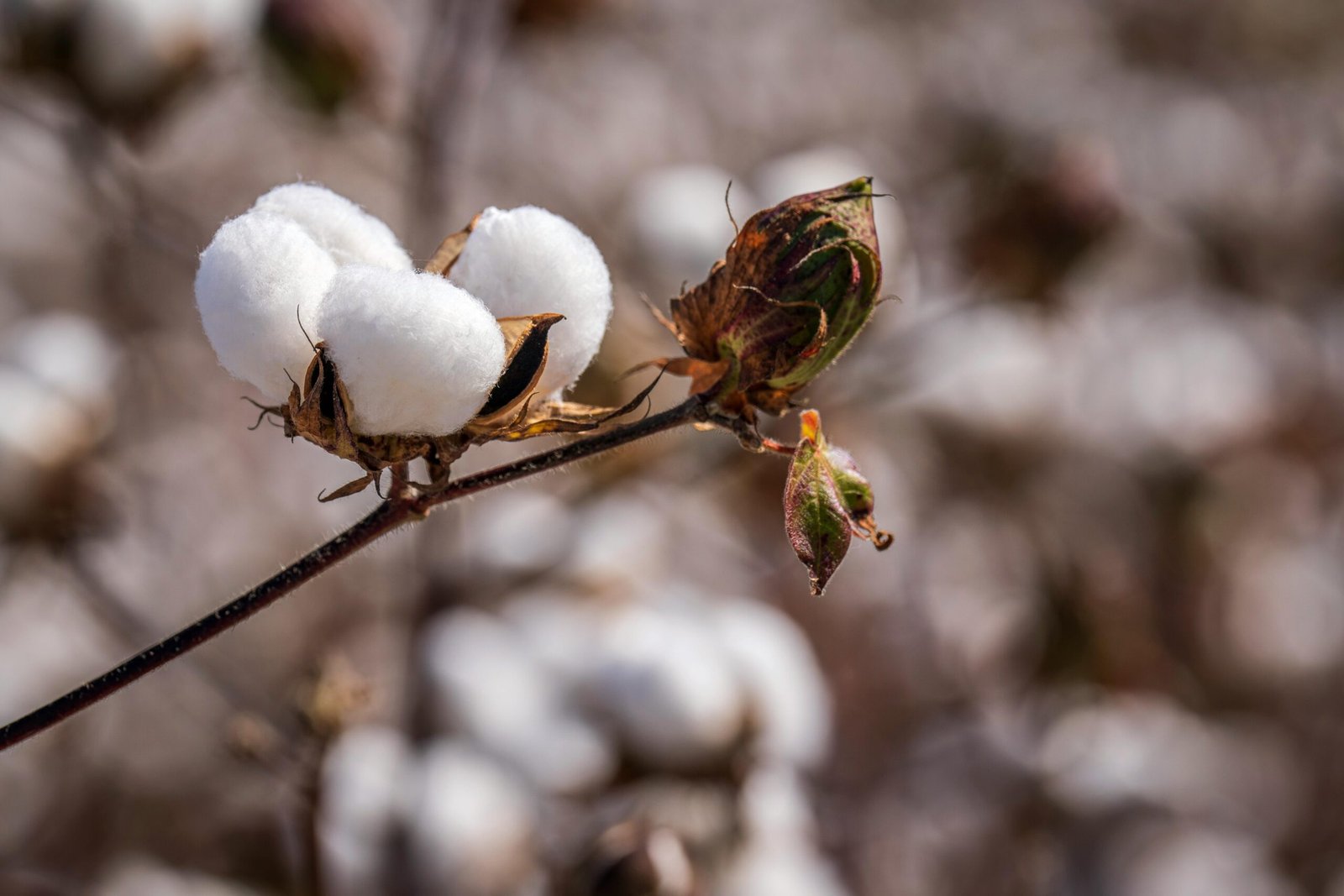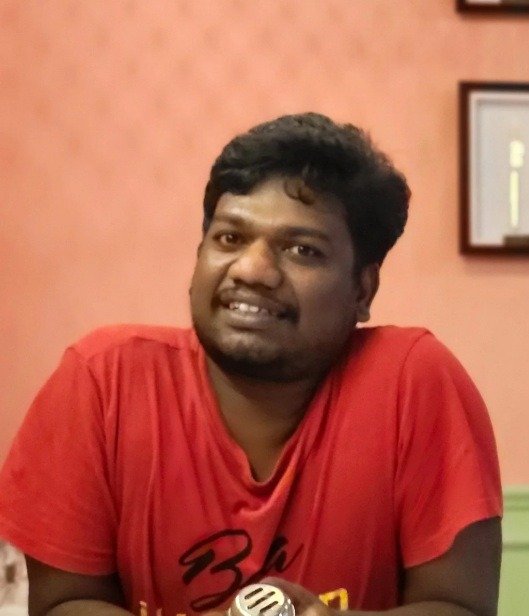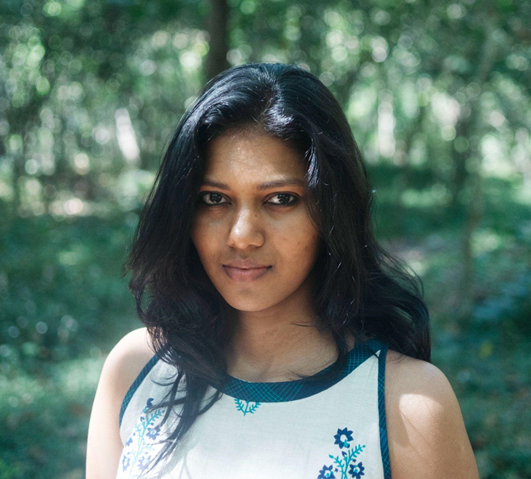Cotton Fever
A short story by Senthil Jaganathan translated from Tamil by Anjana Shekar

Placed third in the Mozhi Prize 2022
WHEN we reached Kumbakonam bus station that morning, time was half past six. It was made possible only because we had woken up as early as 4 am. Amma got down from the bus and told us that her legs had gone numb. She took each step carefully, as if walking on water. From a tea shop at the bus station, Appa got us coffee to drink and tea for himself. As soon as she took a sip of coffee from the cup, Amma’s left hand automatically reached behind her saree to scratch her lower back. This happened every time she drank something hot. She would begin sweating and when she did, the itching would take over. Although we were used to it by now, the looks we got from the tea shop made me feel awkward. By the time we finished our drink a bus to Tirunageswaram town was ready to leave from the bay on the other side. We boarded the bus and arrived at Muthupillai Mandapam.
As we entered the premises of Sacred Heart Hospital, we encountered different kinds of patients. Those with half their fingers melting away, those with their skin peeling off in white patches, those who were wiping away the blood and pus from their knees with cotton, those with sunken noses, gradually losing the shape of their face, those who had swollen patches across their bodies, those whose skin looked red, as if covered with scratches. In every direction we turned, there were only lepers. The moment Amma took in the scene, she gathered the free end of her saree into a ball with trembling fingers and stuffed it into her mouth.
Appa left us to enquire with a nurse at the reception.
‘Sokkayee! look where you’ve abandoned me… I never did no one no harm… Vadakamalayane! Oh, what’ll happen to ma three babies?’ She cried to herself in soft tones, tears streaming down her eyes.
‘Don’t cry amma,’ I told her gently. The sight of those patients, the odour of medicines, and the still-wet floors that reeked of phenyl churned my insides and increased my anxiety. Across from us sat a man whose right hand was wrapped in cloth; he was missing three fingers. Next to him sat a woman, fanning his bandaged hand with a sheet of cardboard. Amma threw furtive glances at them.
Just then Appa returned from the reception desk.
‘Wretched fellow has brought me to this state, damn him!’ her tears turned into anger the moment she saw him.
A few token numbers went by, and soon it was our turn to see the doctor. In his white coat and glasses, he seemed like an ageing Mother Mary. After listening to everything that Appa had to tell, he responded in subdued tones.
‘How did you get by like this for a year? Could you not have come in earlier?’ he asked while writing down something on a paper. Behind him there was a picture of Christ standing amidst a herd of sheep, cradling a black lamb in his arms. Amma’s eyes, brimming with tears, remained focussed on this picture.
‘We will run a blood test now and begin treatment based on the results. I am going to write down some tablets for you to take and you can come back next week. There’s a specialist coming in from abroad. Don’t worry… we can cure this.’ As soon as the doctor said this, I saw hope glisten in Amma’s perpetually teary eyes.
When the nurse extracted blood from a vein on her hand, Amma ground her teeth and shut her eyes. For someone who had never paid heed to any kind of sickness for more than two days, Amma now feared the thought of even the slightest prick on her skin.
The doctor’s confidence and the way he closed his eyes in the end to pray for Amma gave us hope. As soon as she got into the bus, she rested her head on Appa’s shoulders and fell asleep.
***
About a year and a half ago, around the end of a harvest, Appa, who was having his dinner, told Amma: ‘This time, let’s not plough. Let’s go for cotton fully. I’ve asked the Thinnandiyur cotton merchant to keep aside some seeds.’ He paused waiting for her reply. Amma spoke while serving buttermilk from a pot resting in the uri ropes that hung from the ceiling. ‘There’s paddy seeds, isn’ it? Even when the earth was parched and cracked didn’ we bend and toil to bring water, save pourin’ it by the handfuls? Now there’s plenty of water, isn’ it?’ she spoke softly, taking care not to wake my brother.
‘And ter what use was that? Ter have sown and laboured day an’ night? We’ve got ter think about our boy’s college admission. We’re goin’ ter have ter pay back the remaining debts. And before my time’s up, I want ter build a house… I’m sayin’ we grow cotton now so we can see some money. Tomorrow I ain’ the one who’s goin’ ter enjoy ‘em all.’ his voice rose, angry and uncontrolled. Amma remained quiet only because she feared that Appa might leave without finishing his dinner. My brother who was half asleep woke up with a start and scratched his head. She comforted him back to sleep.
This time, Amma was not for sowing cotton. Two months ago, when she swooned under the Ayyanar temple palm tree, Mayavaram Narayanan doctor had said that she had high blood pressure. Since then she tried not to spend long hours under the sun or strain herself with too much work. But she was able to keep this up for only a week. As the time for harvesting drew closer, Amma took it upon herself to oversee all the work. On the last day of the harvest, while they were winnowing the paddy grains, she hyperventilated and fainted once again. This time they made her lie down under the banyan, resting her head on one of its roots.
On the one hand, cotton demanded twice the work. One’s throat would dry up and tongue fall out just to keep off the Panampalli cattle from grazing the lands. On the other hand, it was only because of the cotton we had sown earlier that we were able to buy a wet grinder for the house and reclaim the two sovereign gold earrings that were pawned off at the Sirkazhi Cooperative Society over three years ago. Now the Ayyanar pond was brimming with water and the well-maintained diesel engine too gave us no worry. We could be sure of a good supply of water. We could reap in abundance.
Amma’s thoughts raced from buying a television set for the house so the children wouldn’t have to go from house to house to watch TV, to escaping from the smoky kitchen by purchasing a gas stove. Only the state of her health stopped her short of saying yes.
But Appa had already made up his mind. With a fifty thousand rupees investment, if one were to dedicate just four months to the cotton, the returns would be three times as much. And so he bought cotton seeds from the cotton merchant in Thirunandriyur. The next day was in ascension. He consulted the calendar and found that it would be best to sow them the following day. It was Amma who soaked the seeds herself in cow dung milk that same night. She kept her indifference only until a decision was still to be made. The minute something entered the house, it became hers. With the seeds soaking in the dung mixture, Appa shovelled and cut furrows across the field the very next day. Since it was recently cultivated, he didn’t have to level it once again. For Amma it was a bit of relief that the levelling expenses were spared.
We drilled in the end sticks on either end of the furrows and ran taut strings across them. Across these lines, we dug holes at three-feet intervals. Amma and I sowed the seeds along with my younger brothers. On the fourth day, the saplings showed their heads and she looked at them with maternal joy, like someone inspecting a newborn ward at a hospital. We replaced the seeds that didn’t germinate with those that we had nursed at home. Generally, people tended to mark these spots with a stick wrapped in paper but Amma always knew, without a doubt, which row and which hole had the bad seed. She had a way of knowing the earth’s every movement. Once my grandfather beckoned me and said, ‘Your ma, she’s got them earth lines memorised.’ I have borne witness to the true meaning of those words many times.
Amma did not feel the strain of the seventh day watering because Appa was around. On the fifteenth day when it was time for the next watering, he had to leave town to attend a relative’s wedding and we too were away in school. Amma scouted for someone to buy diesel for the engine, started it on her own and made sure every sapling had its supply of water. With the same vigour, she took up fertilising the two-acre field herself, with just one other person to help. This, she accomplished in just half a day. In the subsequent days, it was time to begin weeding the field. Amma called for a few field hands. From bringing them tea and vadai to weeding the missed-out patches herself, she took care of it all. The physical stress of it made her often exclaim, ‘Ah! Could just grab my rib bones and throw ‘em away!’ But the sight of healthy plants swaying in the breeze would make her forget all her pain the very next day. ‘These cotton plants… lookin’ like sucklin’ children. Even forget my pain sometimes,’ she’d say. Even if saliva gathered in her throat, she’d only dampen the roots with her spit.
Every morning one has to walk into the fields around the same time as the grazing cattle. If not, they’d just raze through our hard work. The cattle herders would let loose the bovines and doze off under the banyan trees or play the strategic aadu puli aatam board game – the ones with pieces for lambs and tigers – at the pillared temple halls or wander off to gather palm dates. Unbeknownst to the herder, the cattle would turn towards the fields. And when that happens, one has to howl and clamour loudly and run in all directions to chase them away, unmindful of the thorns that pierce and tear the sole of the feet.
In addition to the cattle, worms and insects are cotton’s worst foe. Leaf-coloured worms and pale-red insects can destroy cotton. They can’t be controlled even when insecticide is sprayed with the help of sprinklers. What makes matters even worse is when there are trees surrounding the fields. Our field was bordered by Indian mulberry, fence firewood and portia trees and as a result many insects began infesting the cotton. Our biggest blow came when the cotton’s agony somehow transferred onto Amma. While tending to some of the infected plants, she felt a slight prick on her left palm. On an impulse, she massaged it off.
On the first day, under the impression that it was just an insect bite, she applied brine. When the swelling did not reduce, she resorted to home remedies like crushed turmeric and slaked lime in coconut oil. When that too didn’t work, she had to take an injection at the terrace doctor’s clinic in our town. Only then did the swelling reduce. But as time went by, the itch that originated at the bitten spot intensified. A kind of a persistent, unsatisfiable itch like the one felt in the stomach of a pregnant woman, a feeling like that of a thousand prickly worms crawling at once across the body. Amma would scratch herself so hard that her nails would bear bloody stains. Those same nails then caused the itch to spread. In time, her body became covered with hardened and flaky skin like that of a ringworm infection. Some said it was shingles, some said it was ringworm. Everyone who saw her turned into doctors.
When home remedies gave her no relief, some suggested that country medicines would work better when it came to treating skin diseases. And so we went to a country doctor in Sirkazhi. We were asked to avoid all allergy-causing food items like brinjals, dried fish, milk coffee, tea and fish. The country doctor prescribed an oil to be applied all over her body and tablets to be taken before and after meals too. His prescription, however, led to no improvement. Instead, the frequent bustling in the summer heat only made her suffer more. All this turned into anger directed at Appa.
‘Are you not takin’ me to a good hospital because it’d cost you more? Is that why you’re making me roam here and there and tormentin’ me like this?’ With that question, Appa gave up on country medicine.
In three months’ time, the pods were bursting out and the cotton was ready to be picked. In spite of her health, Amma went into the fields. ‘Don’t miss out on any of the open pods my dears. God’ll bless you for it,’ she’d say, seated at the boundary, to those picking the cotton for us.
When there’s field work being done, Amma would never be able to sit in one place for more than half an hour. She wouldn’t be able to resist getting down and picking through a few pods herself. These she would collect in the pocket made by tucking in the folded ends of her saree at her waist. At the end of a cotton harvest, there’d be four months’ supply of kindling for the kitchen. But now that didn’t matter because Amma detested going anywhere near the stove.
The moment the heat from the stove reached her skin, she would begin to sweat and itch. By the time she could finish cooking, Amma would writhe as though burning. During the early days, we did not know to think otherwise, but slowly we began to regret asking her for coffee or tea. What upset her the most was when people asked about the scabs on her hands and neck and legs, in places that weren’t covered by her saree.
Neighbours and relatives seemed repelled by Amma’s condition. Once, when our aunt’s mother-in-law passed away, Amma wanted to join the lamenting circle formed by a group of closely related women, including our aunt. And when she did, they started leaving one after the other, repulsed by the thought of coming into contact with her. Amma would often recall that incident and grieve. Since then, she began avoiding any kind of gatherings. If there was no way out but to visit, her torment would begin with the bus journey itself. The sweat and the heat would aggravate her itching. Sometimes, she would grab anything that was close at hand to relieve the itch. We could hear the raspy sound of nails on skin even in the middle of the night. Amma, sleepless, would be scratching herself using the hand fan, and doze off only around dawn.
That day too, she woke up tired, with puffy eyes. Realising how late she was, she rushed to cook. Appa sat down to eat at 11 am. Having mixed kuzhambu with rice, all it took was one mouthful for him to realise that it had no flavour, no salt, no spice. He kicked the kuzhambu bowl and spat out, ‘Disgusting. Can’t even bear ter taste this. Thuu…’ As if someone had yanked the hair from the crown of her head, Amma who was seated on the doorstep blew up in rage. She picked up the kuzhambu bowl that came rolling towards her, aimed at the wall and flung it with great force. Whatever remained in the bowl splattered all across the walls and the floor. ‘With sores on every inch of my body I’ve not been unable to sit or stand. Showin’ me your arrogance, are you? That am not pleasin’ your taste buds, you son of a bitch! You don’t even bring me a cup of water if I fall sick. And you’re kicking my own kuzhambu at me?’ she burst out, hurling the rice pot towards the street. The ruckus brought our neighbours outside. Although he must have felt like kicking her, the sight of Amma’s sudden fury sent a tremor through his body. Never had he seen such anger in her.
Amma was in the habit of bathing twice a day. She especially liked taking long showers, using at least five bucketfuls of cool water. This routine stopped ever since her body became riddled with sores. Even if she did, she would hurriedly pour warm water over her body. Water tended to soften the skin around her sores and when she towelled her body down, she felt pin pricks on those unhealed scabs. So, Amma avoided bathing for days.
By then we had lost all hope in country medicine and Appa took her to a skin specialist in Mayiladuthurai. Every day she’d be seen carrying a handful of tablets, syringes, and ointments. Within a short period of time, the sores turned into scabs that peeled in flakes. Pus began oozing out from them, and the scabs remained unhealed. Our worried enquiries were dismissed by the doctor who said that was the only way to heal fully. With the summer heat rising, Amma’s body was a sight of festering sores. If there was a power cut at night, she would howl in pain. We’d be jolted awake, only to watch her toss and scream. My brothers would hold me tight in fear. Startled by Amma’s wailing and moaning, my youngest brother would begin crying. Slowly her sounds would die down and we too would doze off, only to be woken by her piercing sobs. ‘Sokkayee! This is torment, Oh! Don’t you feel no pity for this sight of me? Or have you lost your eyes?’ Facing the entrance, she’d shriek with fury, slapping her face. The sight would just wrench our gut in horror.
Well into the morning, after we had woken up, we’d find Amma asleep. Since Appa took care of sending us to school, she was able to take a break from the kitchen. During those days, Amma would lie covered in Appa’s white veshti because she could not bear the pain of any other fabric coming into contact with the scabs that had turned sticky and gooey. The stench of rotting skin filled the house. In time, Appa made us eat near the stove in the backyard. We then began sleeping in the backyard too. At one point, if we happened to enter the house, Amma began to throw anything she could grab at us, screaming, ‘Get out! Get out!’
***
When the conductor blew his whistle at Solasakkaranallur, I jolted awake. The windswept tears had left dry streaks down my face.
As soon as she returned home, Amma sat in silence in front of our family deity’s picture. Her silence unsettled our balance. It worried us even more when she refused to talk the whole day. A growing anxiety for the test results took root in Amma’s heart from the very next day. Her unending tears caused her face to swell up. ‘Whose curse, which woman’s anguish… it circles around my feet. Never sought out anyone’s hand in help. Do I have to watch my own hands melting away? What’ll happen to my family… They’d be abandoned,’ she cried, pounding on her chest. She found some relief in Appa’s words. ‘It’s a hospital for leprosy, yes. What makes you think that you’ve got it? We’ve been everywhere for treatment. Many pointed us ter that hospital. Let’s trust in god and continue here. It’ll all be okay.’
I was in the backyard, alone, when my second brother came to me. He always slept next to Amma and was fed by her. Ever since she fell sick, he was gripped by a longing. ‘Big brother, when will Amma get better?’ he asked me. ‘Soon,’ I told him but even when I did, I was reminded of all the faces and the hands that I had seen at the hospital. Every time I imagined Amma’s fate turning out to be like that, I shook my head.
Appa vowed to walk to Palani as a family, if Amma healed completely. Every morning, my brothers and I prayed to our family deity and then to the town’s elephant god, Pillaiyar.
After a long time, Amma gathered all of us together and passed around rice balls that she had mixed with kuzhambu. For almost three months, she had avoided cooking and it was Appa who had served us food. There was a reason why. An old lady, who had come to visit us three months ago said to our neighbour, ‘She’s been grindin’ batter with those hands. She’s been cookin’ and feedin’ ‘em with those hands. If the young ones were to get her disease, what’ll she do? Shouldn’ a woman of the house think of all this?’ When that comment reached her, Amma bawled, pounding her chest. A while later, wiping away her tears she said, ‘Ma hands won’t harm ma own children. I’ve done no one no bad. Nothin’ would happen to ma children, Magamayi… Nothin’ should befall them.’
The next day being a Tuesday, Amma and Appa went to Vaideeswaran temple. Standing outside the temple’s main deity, Thaiyal Nayagi’s sanctum sanctorum, she asked Appa, ‘Shall we finish our prayers here and go directly to the hospital?’
‘Why, we’ve got five more days! We can go then,’ he said. But Amma didn’t want to give up. ‘I don’ care about results. Lemme go now. I’ll tell the doctor lady myself. I’ll ask to stay. I’ll water the plants, I’ll sweep the floors…I’ll eat what I can get. Can I not stay there?’ she pleaded. Appa, who hadn’t shed a tear until then, couldn’t bear it any longer. He covered his face and cried. Amma didn’t bring it up again.
Next week, we went back to the Sacred Heart Hospital. A few doctors had come from abroad. They gave Appa an English name for the skin disease caused by an insect bite. The treatment commenced. They said that she shouldn’t, at any cost, go back to wearing the poonam and polyester sarees that she had worn until then. Three days later, Appa bought four new sarees for her.
A nurse who walked in to give her an injection asked her with curiosity, ‘What kind are these sarees?’ It was Appa who answered, ‘These are pure cotton, miss.’ Amma’s fingers kept caressing the soft fabric, smooth and delicate like a newborn baby’s hair. Lost in thought, she buried her face in them and wept.

Cotton Fever, by Senthil Jaganathan, translated from Tamil by Anjana Shekar





